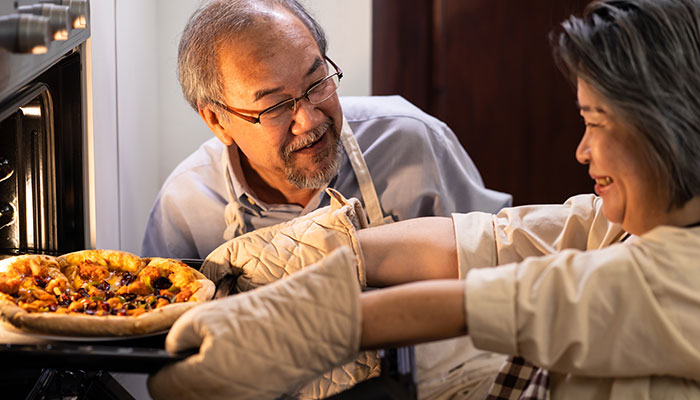
Persons over age 65 are 2.6 times more likely than the general population to die in a home fire. That’s alarming!
Older adults most often incur burns at home, typically when cooking or bathing. The most common burn injuries are from scalding hot water or flames.
Many factors contribute to an older adult’s high susceptibility to burns:
- Diminished sense of hearing, sight, and smell. They may not hear a smoke detector, see a spark, or smell a gas leak.
- Slowed or limited ability to move around. They may not be able to exit quickly when in danger.
- Fragile skin. With such a thin protective layer, they are more vulnerable to heat.
- Medications that cause drowsiness. Drugs that lead to drowsiness and slow reaction times put your loved one at greater risk.
Here are some safety tips for preventing burns:
Kitchen
This is the room where burns most commonly occur.
- Stay in the kitchen when cooking. It’s too easy to forget and leave a burner on when leaving a room. Alternatively, set a loud timer that will keep going until it’s turned off.
- Avoid loose, long sleeves when cooking. Instead, wear snug sleeves or short-sleeved or sleeveless tops.
- Use mitts when lifting hot pans or casseroles.
- Put a pan lid on a stovetop fire to rob it of oxygen.
- Cook using a microwave oven.
Electrical fires
- Repair frayed wires.
- Don’t overload power strips or outlets.
- Use only one appliance per outlet.
- Use extension cords for short-term needs. They are not meant as a permanent solution.
- Use heating pads with a timer. Do not sleep with heating pads turned on.
- Leave three feet of space around a space heater and shut it off when the last person exits the room.
Smoking-related
- Do not smoke in bed.
- When drowsy, put out the cigarette or smoke outside.
- Never smoke while oxygen is in use. Leave the tank indoors and go outside to smoke.
- Use cans filled with sand or large ashtrays to douse cigarettes.
Miscellaneous
- Turn the water heater to 120–125 degrees Fahrenheit.
- Check the smoke detector regularly.
- If your loved one is hard of hearing, install a smoke detector that also flashes light. In the bedroom consider one that vibrates a pad that can be placed under the pillow.
This article is brought to you by Solace Hospice.
Might you or a loved one benefit from hospice care?
Check out our services
- Hospice in Phoenix, AZ and neighboring communities
- Hospice in Scottsdale, AZ and neighboring communities
- Hospice in Peoria, AZ and neighboring communities
- Hospice in Sun City, AZ and neighboring communities
- Hospice in Surprise, AZ and neighboring communities
- Hospice in Mesa, AZ and neighboring communities
- Hospice in Chandler, AZ and neighboring communities

